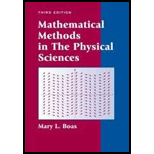
Assume from electrostatics the equations
Want to see the full answer?
Check out a sample textbook solution
Chapter 13 Solutions
Mathematical Methods in the Physical Sciences
Additional Math Textbook Solutions
Elementary Statistics (13th Edition)
Probability And Statistical Inference (10th Edition)
Elementary Statistics
University Calculus: Early Transcendentals (4th Edition)
Basic Business Statistics, Student Value Edition
- iii) i=5 x² = Σ i=1 (Yi — mi)² σ 2 By minimising oc², derive the formulae for the best values of the model for a 1 degree polynomial (2 parameters).arrow_forwardиз Review the deck below and determine its total square footage (add its deck and backsplash square footage together to get the result). Type your answer in the entry box and click Submit. 126 1/2" 5" backsplash A 158" CL 79" B 26" Type your answer here.arrow_forwardRefer to page 311 for a sequence of functions defined on a given interval. Instructions: • Analyze whether the sequence converges pointwise and/or uniformly on the given interval. • Discuss the implications of uniform convergence for integration and differentiation of the sequence. • Provide counterexamples if any condition fails. Link: [https://drive.google.com/file/d/1wKSrun-GlxirS3IZ9qo Hazb9tC440 AZF/view?usp=sharing]arrow_forward
- Refer to page 310 for a matrix and its associated system of differential equations. Instructions: • Find the eigenvalues of the given matrix and classify the stability of the system (e.g., stable, • unstable, saddle point). Discuss the geometric interpretation of eigenvalues in the context of system behavior. • Provide conditions under which the system exhibits periodic solutions. Link: [https://drive.google.com/file/d/1wKSrun-GlxirS3IZ9qoHazb9tC440 AZF/view?usp=sharing]arrow_forwardRefer to page 313 for a nonlinear differential equation and its linear approximation. Instructions: • Linearize the given nonlinear system around the equilibrium points. • Analyze the stability of each equilibrium using the Jacobian matrix and its eigenvalues. • Discuss the limitations of linearization for determining global behavior. Link: [https://drive.google.com/file/d/1wKSrun-GlxirS3IZ9qoHazb9tC440 AZF/view?usp=sharing]arrow_forwardRefer to page 314 for a matrix and its decomposed form. Instructions: • Verify the given singular value decomposition of the matrix. • • Discuss the geometric interpretation of the left and right singular vectors. Use the SVD to analyze the matrix's rank and nullity. Link: [https://drive.google.com/file/d/1wKSrun-GlxirS3IZ9qoHazb9tC440 AZ F/view?usp=sharing]arrow_forward
- Refer to page 312 for a set of mappings between two groups G and H. Instructions: • • Verify which of the provided mappings are homomorphisms. Determine the kernel and image of valid homomorphisms and discuss their properties. • State whether the groups are isomorphic, justifying your conclusion. Link: [https://drive.google.com/file/d/1wKSrun-GlxirS3IZ9qo Hazb9tC440 AZF/view?usp=sharing]arrow_forward12:25 AM Sun Dec 22 uestion 6- Week 8: QuX Assume that a company X + → C ezto.mheducation.com Week 8: Quiz i Saved 6 4 points Help Save & Exit Submit Assume that a company is considering purchasing a machine for $50,000 that will have a five-year useful life and a $5,000 salvage value. The machine will lower operating costs by $17,000 per year. The company's required rate of return is 15%. The net present value of this investment is closest to: Click here to view Exhibit 12B-1 and Exhibit 12B-2, to determine the appropriate discount factor(s) using the tables provided. 00:33:45 Multiple Choice О $6,984. $11,859. $22,919. ○ $9,469, Mc Graw Hill 2 100-arrow_forwardNo chatgpt pls will upvotearrow_forward
- 7. [10 marks] Let G = (V,E) be a 3-connected graph. We prove that for every x, y, z Є V, there is a cycle in G on which x, y, and z all lie. (a) First prove that there are two internally disjoint xy-paths Po and P₁. (b) If z is on either Po or P₁, then combining Po and P₁ produces a cycle on which x, y, and z all lie. So assume that z is not on Po and not on P₁. Now prove that there are three paths Qo, Q1, and Q2 such that: ⚫each Qi starts at z; • each Qi ends at a vertex w; that is on Po or on P₁, where wo, w₁, and w₂ are distinct; the paths Qo, Q1, Q2 are disjoint from each other (except at the start vertex 2) and are disjoint from the paths Po and P₁ (except at the end vertices wo, W1, and w₂). (c) Use paths Po, P₁, Qo, Q1, and Q2 to prove that there is a cycle on which x, y, and z all lie. (To do this, notice that two of the w; must be on the same Pj.)arrow_forward6. [10 marks] Let T be a tree with n ≥ 2 vertices and leaves. Let BL(T) denote the block graph of T. (a) How many vertices does BL(T) have? (b) How many edges does BL(T) have? Prove that your answers are correct.arrow_forward4. [10 marks] Find both a matching of maximum size and a vertex cover of minimum size in the following bipartite graph. Prove that your answer is correct. ย ພarrow_forward
- Algebra & Trigonometry with Analytic GeometryAlgebraISBN:9781133382119Author:SwokowskiPublisher:Cengage
